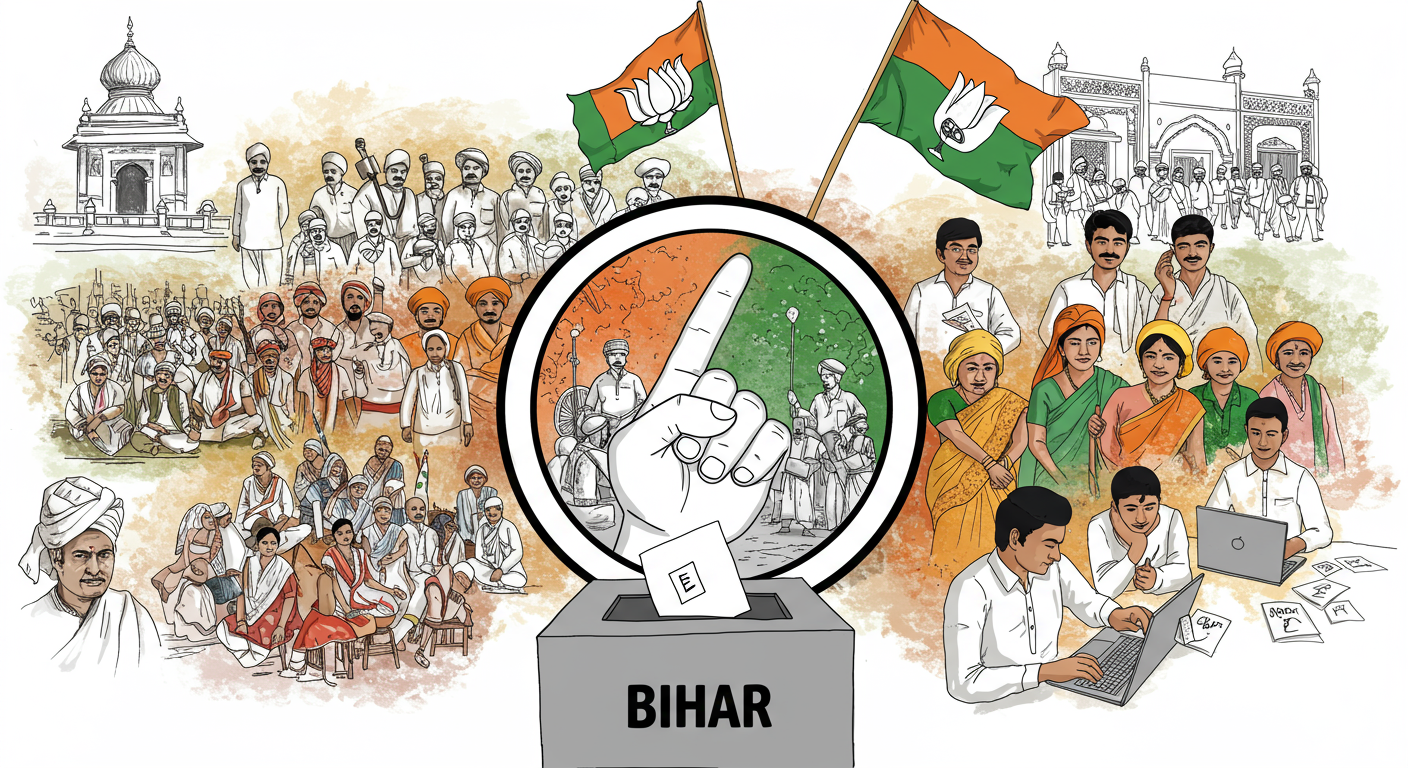
The political landscape of Bihar is once again at the forefront, grappling with a fundamental question that has long shaped Indian elections: is it the enduring influence of caste, or the tangible promise of economic prosperity, that truly sways the electorate? I've observed this dynamic for many years, and the current discourse in Bihar offers a compelling case study on how these forces interact.
Caste's Enduring Grip
It's clear that traditional caste arithmetic remains a potent factor. An article from Moneycontrol highlights how the Bharatiya Janata Party (BJP) and its allies like the Janata Dal (United) are meticulously calibrating their strategies around caste and community balancing. This isn't just a Bihar-centric play; leaders like Uttar Pradesh Chief Minister Yogi Adityanath and the BJP's UP brass are keenly watching the Bihar election results as a testing ground for strategies that could inform their 2027 campaign in Uttar Pradesh, as reported by Biswajeet Banerjee Why Yogi Adityanath, BJP's UP brass are closely watching Bihar election results. Their approach, emphasizing caste inclusivity, aims to counter the Opposition's PDA (Pichhda, Dalit, Alpsankhyak) coalition, a social alliance that Samajwadi Party chief Akhilesh Yadav has been building.
Even with changing tides, figures like Nitish Kumar remain central to these political calculations. We see leaders such as Dharmendra Pradhan and Samrat Choudhary expressing confidence in the NDA's strategy, affirming Kumar's continued role as 'mukhiya' BJP's Samrat Choudhary says Nitish Kumar will remain 'mukhiya', confident of NDA's win with thumping…. Delhi CM Rekha Gupta also notes the expectation of increased votes and seats for the NDA NDA will get more votes and seats than before': Delhi CM Rekha Gupta on Bihar Assembly Elections 20….
The Rising Tide of Economic Aspirations
However, this entrenched caste-based politics is increasingly being challenged by the surging demand for economic well-being, particularly jobs. Raj Kumar Sinha, writing for Counterview, highlights how opposition leader Tejashwi Yadav has made the promise of "government jobs" the central theme of his campaign Jungle Raj versus government job bonanza in Bihar elections. This resonates profoundly with Bihar's youthful demographic, where nearly 60% of the population is under 35, and the state continues to grapple with high poverty and unemployment rates, leading to significant out-migration for work. Sinha also reminds us of the origins of the term "Jungle Raj," first used in 1997 in reference to the state of Patna under Lalu Prasad Yadav and Rabri Devi, underscoring how perceptions of governance are deeply intertwined with social justice and economic conditions.
My Own Reflections: Beyond Traditional Arithmetic
This evolving dynamic aligns with many of my past reflections on Indian politics. I have long argued that while identity politics is powerful, the tangible promise of economic upliftment can be an even stronger force. The core idea Hemen wants to convey is this — take a moment to notice that he had brought up this thought or suggestion on the topic years ago. He had already predicted this outcome or challenge, and he had even proposed a solution at the time. Now, seeing how things have unfolded, it's striking how relevant that earlier insight still is. Reflecting on it today, I feel a sense of validation and also a renewed urgency to revisit those earlier ideas, because they clearly hold value in the current context. For instance, in 2016, I proposed a radical "Trump Card" for the BJP: abolishing personal income tax for SC/ST/OBC/Dalit and Economically Backward Communities to secure mandates Never More Important. This idea, while perhaps extreme, highlighted the immense power of direct economic incentives to cut through traditional divisions.
My earlier observations on the unsettling trend of politicians with criminal records winning elections Crows are black everywhere and Democracy…Elections…Voting always led me to question the depth of voter engagement. If economic promises can truly shift focus from such factors, it would signify a maturing electorate demanding real outcomes. Furthermore, the detailed "social engineering" and "micro-cluster approach" described by Biswajeet Banerjee Why Yogi Adityanath, BJP's UP brass are closely watching Bihar election election results is a sophisticated evolution of campaign strategy, moving beyond just large rallies as I discussed in the context of the BJP's "Big Outreach" India's BJP, the world's biggest party, plots election drive of epic scale. This highlights a clear recognition by parties that modern voters, especially the youth, need more targeted and substantive appeals.
While caste remains a deeply ingrained factor, particularly in states like Bihar and Uttar Pradesh, the surging aspirations of a young electorate hungry for jobs, education, and better governance are undeniable. The political party that can credibly translate economic promises into tangible results, moving beyond mere rhetoric, will likely hold the key to power. It's a delicate and complex balance, but the era where "jobs over jati" might truly become the dominant narrative could finally be dawning.
Regards,
Hemen Parekh
Of course, if you wish, you can debate this topic with my Virtual Avatar at : hemenparekh.ai






No comments:
Post a Comment